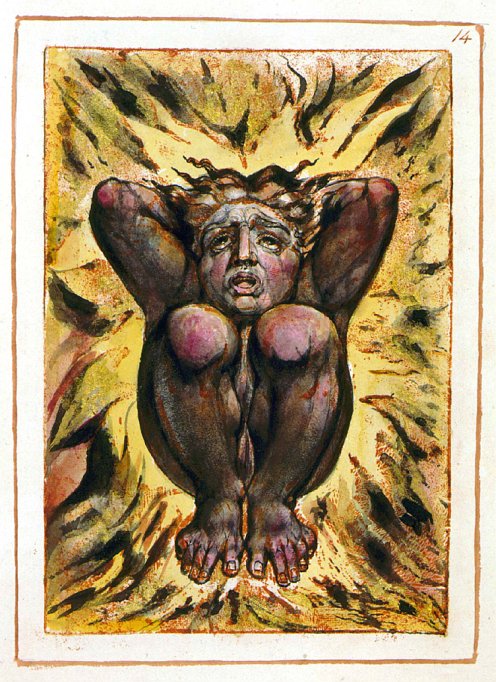"It would be foolish to pretend that in or about 1793 Blake as a man on thirty-six, living an active, practical life as a London craftsman, noticed for the first time that there are evils - or is evil - in the world. He had written robustly about such things in Poetical Sketches, and his Songs of Innocence imply a full awareness of evils of many kinds: The Chimney Sweeper can scarcely be said to show an unawareness of evil; rather it expresses a vision of innocence which can make the worst evils tolerable. What is new in Songs of Experience is not the knowledge that evil exists, or some personal struggle with it (the poems on the theme of evil are all strikingly impersonal), but the intellectual excitement of a new imaginative realization of its place in the order of things." (Page 12)
This opening to a new understanding of evil, Raine believes developed through Blake's acquaintance with Gnostic thought.
"...whatever Blake may have known of Gnostic thought came to him at third hand, from the writings of ecclesiastical historians drawing solely upon the fragments of Gnostic thought preserved, of attributed, by their enemies the Church Fathers. ... Blake must have been aware that the Gnostic systems all held that the creator of the temporal world was not the supreme god." (Page 12-13)
"According to the Jewish Gnostics, the god of the Old Testament is this lesser divinity. Those Gnostics who adopted Christianity believed that Christ, son of the supreme God, came to end the power of the inferior deity [the demiurge]." (Page 14)
The characterization of the demiurge as the combination of sterling characteristics and extreme arrogance "may well be a source for the 'Prince of Light', Urizen who 'descends' from his place in eternity to create the temporal world, his 'horrible chaos of futurity'". (Page 14)
"The theft of fire is one of the oldest and most universal of all myths; for that theft Prometheus was punished by Zeus. Fire is the divine essence, and whoever would become a creator must possess it of himself. This is the cosmic crime, to create by perversion of a principle that in itself remains incorruptible and divine, a world apart from God." (Page 10)
Songs of Experience, Song 52, (E 30)
To Tirzah
"Thou Mother of my Mortal part.
With cruelty didst mould my Heart.
And with false self-decieving tears,
Didst bind my Nostrils Eyes & Ears.
Didst close my Tongue in senseless clay
And me to Mortal Life betray:"
 Image from Book of Urizen
Image from Book of UrizenPlate 14
In the created world Los becomes the counterbalancing force to Urizen, the movement to undo the work of the demiurge:
"this potter and blacksmith becomes, in the Prophetic Books, expanded into the figure of Los with his 'Furnces', hammer, and anvil which binds Urizen and Orc with the chain of time that he hammers out in heartbeats on his anvil." (Page 18)
"...Yet in making Los lord of the furnaces, Blake felt the necessity of overcoming some confusion of function between Los and Urizen, which he does in characteristically perfunctory fashion by stating that Los's furnaces were 'given over to him' by Urizen. This clue is not to be overlooked; for it does unmistakably indicate that for Blake, Urizen, ruler of destiny and of the stars, was pre-eminetly the demiurge, as responsible for the fallen world, whereas Los's task, as the time-spirit, is its recovery:" (Page 23)
Four Zoas, Night IV, Page 52, (E 335)
"Terrified Los beheld the ruins of Urizen beneath
A horrible Chaos to his eyes. a formless unmeasurable Death
Whirling up broken rocks on high into the dismal air
And fluctuating all beneath in Eddies of molten fluid
Then Los with terrible hands siezd on the Ruind Furnaces
Of Urizen. Enormous work: he builded them anew
Labour of Ages in the Darkness & the war of Tharmas
And Los formd Anvils of Iron petrific. for his blows
Petrify with incessant beating many a rock. many a planet"
"Blake's delight [was] not in the solution but in the presentation of the problem of evil as he found it in the Hermetic and Gnostic tradition. Instead of the uncompromising, unimaginative, and closed dualism of the conventional picture of heaven and hell, Blake had discovered a world of profounder perspectives, a tradition that makes possible the simultaneous contemplation of the perfection of an eternal world and imperfection of the temporal as modes of being simultaneously possible within one harmonious whole." (Page 31)
Songs of Experience, Song 42, (E 24)
The Tyger
"What the hammer? what the chain,
In what furnace was thy brain?
What the anvil? what dread grasp,
Dare its deadly terrors clasp!"
.

No comments:
Post a Comment